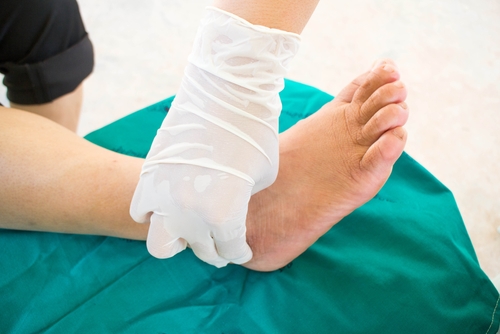According to the American Diabetes Association, about 15.7 million people (5.9 percent of the United States population) have diabetes. Nervous system damage (also called neuropathy, which we test for and treat at our Anderson Center for Nerve & Chronic Pain) affects about 60 to 70 percent of people with diabetes and is a major complication that may cause diabetics to lose feeling in their feet or hands.
 Foot problems are a big risk in diabetics. In a diabetic foot, a wound as small as a blister from wearing a shoe that’s too tight can cause extensive damage. Diabetes decreases blood flow, making injuries slow to heal and placing them at risk for infection. These infections can spread quickly as well.
Foot problems are a big risk in diabetics. In a diabetic foot, a wound as small as a blister from wearing a shoe that’s too tight can cause extensive damage. Diabetes decreases blood flow, making injuries slow to heal and placing them at risk for infection. These infections can spread quickly as well.
Diabetics must constantly monitor their feet or they could face severe consequences, including amputation. If you have diabetes, you should inspect your feet every day. Look for puncture wounds, bruises, pressure areas, redness, warmth, blisters, ulcers, scratches, cuts and nail problems. Get someone to help you, or use a mirror. If you find something, make an appointment to see one of our doctors for treatment.
Here’s some basic advice for taking care of your feet:
- Keep your feet warm and dry.
- Don’t put your feet on radiators or in front of the fireplace.
- Don’t smoke or sit cross-legged. Both decrease blood supply to your feet.Don’t use heating pads or sharp instruments on your feet.Trim your toenails straight across. Avoid cutting the corners. Use a nail file or emery board. If you find an ingrown toenail, contact our office.
- Don’t put any lotion between your toes.
- Avoid stockings with elastic tops.
Diabetic Foot Ulcers and Charcot Foot
When your feet become numb, they are at risk for:
- Ulcers, which are open sores that may become infected.
- The bone condition Charcot foot (pronounced “sharko”). This is one of the most serious foot problems you can face and is caused when the bones of your foot fracture and disintegrate, warping the shape of your foot. Because your foot is numb, you feel no pain and continue to walk on it, creating further damage.
Diabetic foot ulcers and early phases of Charcot fractures can be treated with:
- A custom-walking boot, which supports the foot until all the swelling goes down.
- Surgery may be necessary if your deformity is too severe for a brace or shoe.
If you have any concerns with your feet or lower legs such as pain, a sore that won’t heal or becomes infected, reduced sensation to temperatures, numbness, or skin that becomes reddened or looks bruised, please make an appointment to see us.
